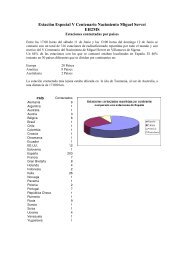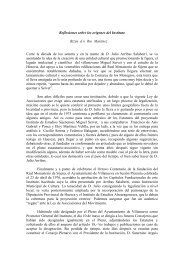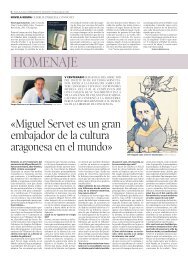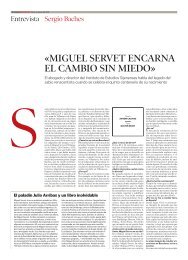New Page
New Page
New Page
Create successful ePaper yourself
Turn your PDF publications into a flip-book with our unique Google optimized e-Paper software.
lose their +learned", professional character. According to the Latin version, the Evangelist consciously<br />
imitates Moses by using in principio, while in the Hungarian +just as Moses explains in order the beginning<br />
of the Old Testament and of creation, so John does the beginning of the <strong>New</strong><br />
Testament..."155 According to the Latin, verbum can be considered a metaphor and a metonymy, while the<br />
Hungarian merely circumscribes that the verb should be understood as Jesus Christ the man. The Latin<br />
employs an erudite explication to show that erchomenon fits both the light and the man and that this is<br />
why Jesus could claim that he was lux mundi. The Hungarian, on the other hand, only states that the Man<br />
Christ is the light of the world and then, instead of expert explication, goes on to denounce the meanness<br />
of the Antichrist.<br />
At the same time, with some of the crucial details, the polyphony perceived in the earlier works of<br />
Dávid does survive. Such, for instance, is the interpretation of the term filius unigenitus. As it is<br />
commonly known, Fausto Sozzini uses a completely new solution in this case as well. Filius unigenitus<br />
is, of course, not first born son for him either, nor does, however, the attribute unigenitus relate merely to<br />
His miraculous birth or dignity, but is used rather with the meaning unice dilectus [especially beloved].<br />
He thinks this is proved by a series of biblical examples: Ishmael was elder than Isaac among the sons of<br />
Abraham, yet the latter is unigenitus; although Solomon was not the eldest among his siblings, he was<br />
entitled to that epithet.<br />
Albeit without an explanation supported by the Greek and Hebrew forms, and relying entirely on<br />
the analogous biblical places, Ferenc Dávid's 30th sermon says that the expression means +particularly<br />
beloved" son. Even when allowing that the phrase might also refer to the miraculous birth and dignity of<br />
Christ, he is following the spirit of Fausto Sozzini, who left ample room for a number of various views.<br />
Another sermon at the same time formulated the position containing Servetian reminiscences that we<br />
have met in Rövid útmutatás:<br />
+Primogenitus omnis creaturae, first born of all created beings, consider what the Scripture wants<br />
to explain in it, I have said before thus it goes in Part 24 of Book Three of the Book of Solomon on<br />
wisdom: Primogenita sum ante omnes Creaturas, Why speaks the Scripture thus? Because the uncreated<br />
wisdom bears the secrets and the image of the future Christ, which for his majesty is called first born<br />
among the created beings."156<br />
Before drawing conclusions, a detail must be mentioned, where Dávid elaborates an idea in the<br />
Latin text in an interesting way. Fausto Sozzini says that one reason why the clause et verbum caro<br />
factum est cannot be interpreted as the incarnation of the Christ existing from eternity is that it does not fit<br />
into the chronological order followed up to that point by the prologue: +For what could be more absurd<br />
than to say that the Evangelist first said that the verb was in the world, had come to his own, and gave<br />
such a power to those who believed in him that they could become the sons of god, and after all this to<br />
say that the verb was made flesh? as if the verb had come to his own before his birth, and had been in the<br />
world first and became flesh only after that."157 Dávid further enriches this argument in the introduction<br />
and conclusion of the treatise disguised as objection. The essence of his reasoning is that the prologue of<br />
John's Gospel gives the +sum" of the main text and follows a chronology closely sticking to that:<br />
describing the task of the Man Jesus Christ (the verb teaching men), telling that it gave light and life,<br />
made his own kingdom and, although many despised it, acquired followers. Then it relates how it was<br />
made flesh, that is to say, humble, miserable, poor, and was cast to curse, i.e. died on the cross. Then its<br />
glory could be seen, which, being full of grace and justice, can only be the glorification after the<br />
resurrection.<br />
This chain of thoughts is complemented with a denouncement of the method that +making the<br />
head into foot" reverses the right relationship between the Synoptics and John's Gospel. He has no doubt<br />
that among the Gospels John's was chronologically the last, and is regarded as first +according to<br />
meaning" by his opponents only so that thereby they could prove that Christ has been born from eternity.<br />
50







